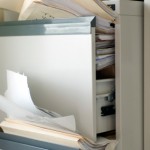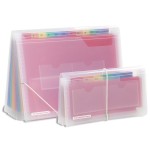One of the most common causes of paper clutter is simply not knowing what to keep and what can safely be tossed. Inevitably, it’s common to keep much more than we need, “just in case.”
To hold on to something when you don’t know if you will need it or not, is like carrying an umbrella with you every day “just in case” it rains.
“Better safe than sorry, ” we say to ourselves and end up cluttering our surroundings, drawers or surfaces with piles of paper. Then, when we do need that important document, we end scrambling and making ourselves crazy, “I know it’s here somewhere!” Keeping more than we need actually ends up costing us more, both in time and money.
A common example I see as a professional organizer is receipts.
If you buy an item and pay cash, you only need to keep the receipt as proof-of-purchase based on the store’s return/exchange policy – generally not more than 30 days and typically less. If you pay by credit card, the same applies and your credit card statement will serve as your proof-of-purchase.
If you make it a habit of checking your purchases (receipts) against your credit card statement, you shouldn’t have to wait more than 30 days to view it as the majority of credit card (and debit) purchases are posted within a few days or less. After 30 days, you can recycle these receipts as well.
The only exception to the 30-day system is if you bought the item with cash for a business expense (not for personal use) in which case you can record it in whatever bookkeeping system you use (ask the advice of your bookkeeper or tax adviser) or follow your organization’s policies for submitting business-related cash expenses you expect to be reimbursed for. Hold on to it until you are reimbursed by your organization then recycle or shred it if it contains personal identifying data such as a Social Security Number or account number.
In summary, if you don’t own a business or submit receipts for reimbursement, there really is no reason for you to keep cash or credit card receipts past 30 days.
For those who are self-employed, simply file the cash receipt with your other business-related expenses, by month. I use a letter size accordion file such as this one from The Container Store.  Until you are ready to toss them, you can keep them in your wallet or in a small container or desktop file with the most recent on top. Just remember to go through them every month or so.
Until you are ready to toss them, you can keep them in your wallet or in a small container or desktop file with the most recent on top. Just remember to go through them every month or so.
Recycle them once their purchase date exceeds 30 days (same goes for ATM receipts too). One final note, since you paid cash they shouldn’t contain account numbers or identifying information but if they do, then shred them.
Interested in more time- and money-saving organizing tips? Subscribe to Back On Track, the e-guide to organized living from LET’S MAKE ROOM
Posted by
